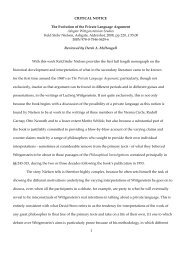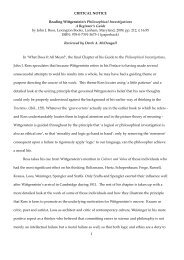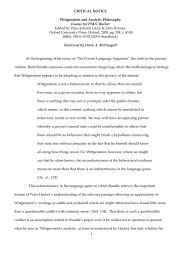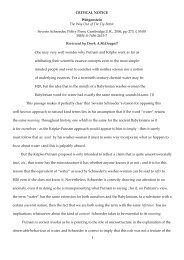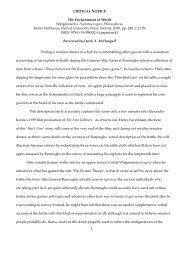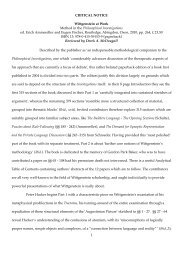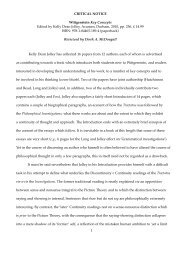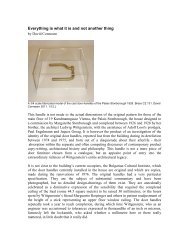Wittgenstein's Philosophical Investigations A Critical Guide
Wittgenstein's Philosophical Investigations A Critical Guide
Wittgenstein's Philosophical Investigations A Critical Guide
Create successful ePaper yourself
Turn your PDF publications into a flip-book with our unique Google optimized e-Paper software.
In his ‘Another strand in the private language argument’, David Stern draws his title<br />
from a well-known 1998 paper of John McDowell in which he argues that the value of Wittgenstein’s<br />
reflections on the impossibility of a private language, rests in their ability to capture the fundamental<br />
principle that the very notion of a primitive ‘given’ with no conceptual content can have no genuine<br />
application. Wittgenstein, if indirectly, is drawing our attention towards the Kantian idea that there<br />
can be no such thing as an experience which is not already immersed in concepts. Yet Stern points out<br />
that this leads McDowell to reject Wittgenstein’s dictum that a sensation ‘is not a something, but not a<br />
nothing either’ (§ 304), for if it can be brought under concepts, then for McDowell it must always be a<br />
‘perfectly good something’ after all.<br />
But here it is arguable that McDowell is failing to sympathise with the methodological<br />
point of § 304, which is that the sensation is something ‘about which nothing can be said’ only if it is<br />
construed on the model of an ‘inner object’; and Wittgenstein goes on to say that knowing that this<br />
colour is red (§ 381) is a matter of having ‘learnt English’, just as one learns the concept of pain when<br />
one learns language (§ 384). In both cases first-person sensation-ascriptions are made without applying<br />
criteria, which they would have to do if one were genuinely referring to objects of experience (§ 288).<br />
This is in keeping with Stern’s claim that Wittgenstein is turning his back on the idea of a pre-linguistic<br />
conceptual content of experience. Yet this point is a methodological one: it is expressed in the claim<br />
that the philosopher comes to think in this way only because there are circumstances in which we do<br />
have new kinds of experiences for which we may require to invent new ‘names’. Yet our ability to do<br />
this in fact only gains its sense against the background of our prior acquaintance with a public language.<br />
Before discussing the main subject of his paper, the place of solipsism in Wittgenstein’s work<br />
from 1929 onwards, Stern reviews the presuppositions found in the secondary literature about the<br />
argument against a private language, pointing out that the argument is often regarded as a deductive,<br />
reductio ad absurdum, whereas in his estimation it is better seen from the perspective of his Pyrrhonian<br />
tradition which stresses instead Wittgenstein’s criticisms of the assumptions that lie behind the<br />
philosopher’s desire to introduce arguments of this kind. This conclusion will be familiar to those<br />
28



